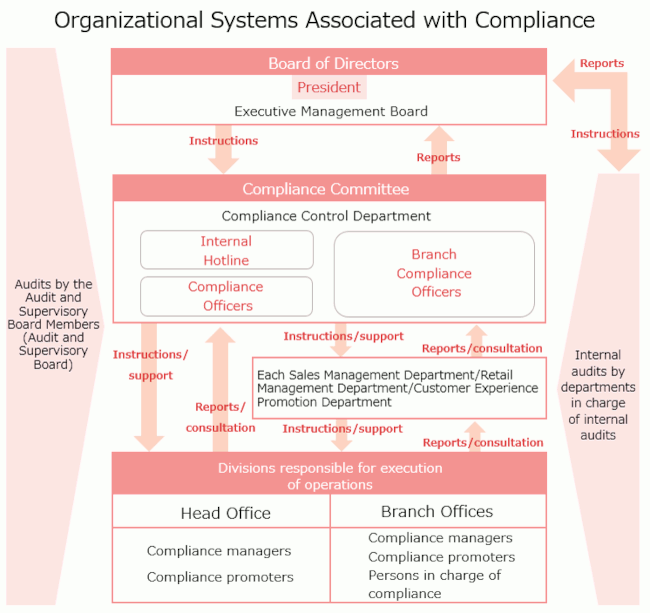- Home >
- About Us >
- Corporate Governance and Internal Control >
- Internal Control : Compliance initiatives
Internal Control
Compliance Initiatives
Dai-ichi Life understands that complying with laws and regulations, its Articles of Incorporation, social standards, and rules in the market is the basis for conducting business activities. To fulfill its social responsibilities and public mission as a life insurance company, Dai-ichi Life is developing systems to promote compliance in all of its operations, including insurance sales and investment.
Policies and Regulations Designed to Promote Compliance
With the Code of Conduct, which outlines specific principles for the behavior of directors, executive officers and employees in order to accomplish its corporate philosophy, regulating compliance, Dai-ichi Life has established Compliance regulations that outline its basic approach to the compliance system. The Compliance Committee holds preliminary discussions regarding important policies and regulations, the Executive Management Board discusses them, and the Board of Directors makes decisions.
Organizational Systems Associated with Compliance
In addition to complying with laws and regulations, we put the customer first and take a forward-looking perspective in order to accurately grasp important compliance-related risks and potential conduct risks in response to changes in the social environment. We have established a risk-based compliance management system. Compliance management is carried out at three lines of defense: business divisions, administration divisions, and internal audit divisions.
Important matters regarding the development and promotion of compliance systems are discussed by the Compliance Committee and then brought to the Management Committee, President, and Board of Directors. Additionally, the Compliance Control Department identifies important compliance-related risks and potential problems and promotes company-wide compliance. In order to increase the effectiveness of compliance promotion, the Compliance Control Department has a compliance officer who supports compliance promotion in each division of the head office, and a branch compliance officer who monitors the status of autonomous compliance efforts at branch offices and provides advice and guidance.
Important matters related to compliance that occur in each organization are reported to the Compliance Control Department through the compliance managers who are the heads of each organization, and the company is prepared to respond and resolve them appropriately. In addition, we have established internal hotline (in the Compliance Control Department) and a consultation service (with outside lawyers) where our executives and employees can directly report and consult on matters related to compliance, such as violations of laws and regulations. The Company operates these systems with full respect for privacy so that those who duly blow the whistle or consult are not subject to unfavorable treatment resulting from their whistleblowing or consultation.
To check whether compliance is being promoted effectively and appropriately, the Internal Audit Department regularly conducts internal audits.
Dai-ichi Life reports matters related to compliance promotion to Dai-ichi Life Holdings as appropriate.
Dai-ichi Life Holdings governs the entire Dai-ichi Life Group through these reports.

Promotion of Compliance
The Board of Directors determines the Compliance Program, which is a specific practical plan related to compliance promotion based on the issues to be addressed each year. Each organization strives to implement a "compliance program" throughout the year. In addition, the heads of organizations, such as head office managers and branch Office General Managers, review the status of compliance promotion in their organizations every year and submit a "confirmation letter regarding compliance promotion" to the president.
The Compliance Control Department regularly monitors these matters and provides guidance as appropriate. The Compliance Committee examines the status of efforts across the company and each organization, evaluates compliance promotion throughout the company, and considers necessary responses. The results of the Compliance Committee's evaluations and deliberations are reported to the Board of Directors, and management takes the lead in implementing the PDCA cycle. In addition to complying with laws and regulations such as preventing unfair transactions (abuse of superior position) that violate antitrust laws, etc. and preventing insider trading, in light of the risk that related laws and regulations of foreign countries will be applied extraterritorially as we expand our business globally, we are working to strengthen our systems related to money laundering/terrorist financing prevention, bribery prevention, and personal information protection.
Maintaining Compliance Awareness and Training and Education for Officers and Employees
Our compliance-related education and training goes beyond simply complying with laws and regulations, and is aimed at encouraging awareness and behavior that meets social demands. We have created a "Compliance Manual" that summarizes laws, internal regulations, specific actions, etc. that executives and employees should keep in mind to strive to raise awareness, thoroughness, and education on compliance, including insurance sales management, information asset protection, money laundering prevention, bribery prevention, insider trading prevention, and conflict of interest management. We regularly and continuously provide compliance training for each position, including executives and compliance managers, in accordance with their roles. We use our company intranet to regularly conduct compliance-related knowledge and awareness tests. We monitor the confirmation status and follow up on their proficiency level. Officers and employees take a pledge based on the Code of Conduct once a year, and this system allows them to proactively promote compliance, thereby increasing the effectiveness of compliance awareness.
Combating money laundering and terrorist financing
Our company recognizes the prevention of money laundering as an important management issue, and has established the "Money Laundering Prevention Regulations," and the executive officers in charge of the Compliance Department and IT Planning Department have implemented company-wide measures to prevent money laundering. We are responsible for building an appropriate system and promoting appropriate business operations. We are striving to prevent money laundering and terrorist financing by establishing a system to appropriately conduct checks at the time of transactions and reporting suspicious transactions, etc., and reporting the implementation status to the Board of Directors, etc.

